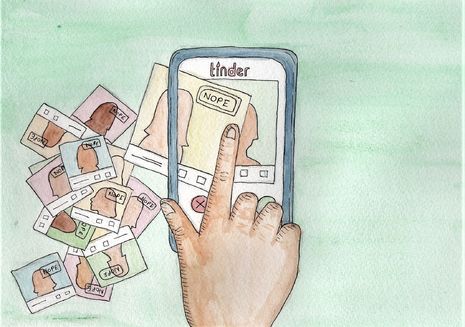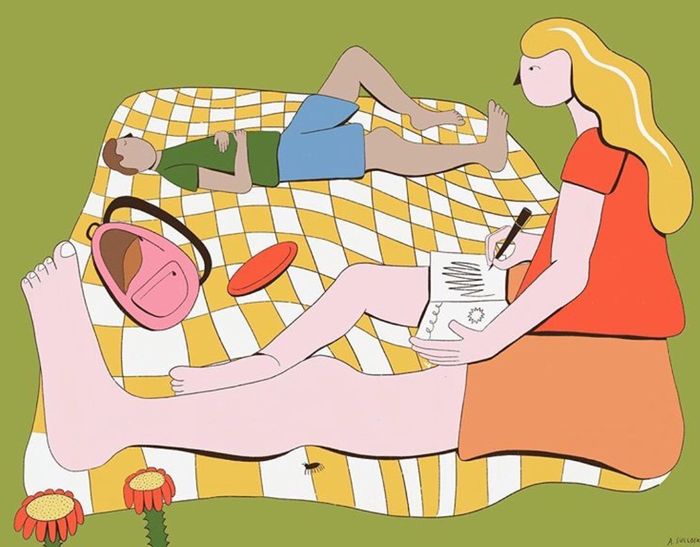Dating post-pandemic
Clara Balon explores the effects of the coronavirus pandemic on dating and relationships.

Content Note: This article contains detailed discussion about the effects of lockdown and the coronavirus pandemic.
Dua Lipa’s song lyric “I would've stayed at home/ 'Cause I was doin' better alone”, resonates with anyone who has experienced the heartache that can be a part of dating and relationships. Lockdown has given us a surplus of time to analyse our past regrets. We oscillate from wishing we’d never got involved with someone to pining after them - especially since it’s pretty much impossible to physically meet someone new.
A few months ago, my friends and I were turning down dates for any reason: from having a bad hair day to choosing a girl’s film night over a (potentially awkward) evening with a guy we barely knew. We took for granted things that we’re now unable to do, like clubbing, house parties, pub trips and most of all dating.
"As someone who has endured lockdown single, I’ve been starved of company and attention to the point where even a tinder walk date looks appealing."
The pressurising environment of Cambridge often means that there's more love-life drama than there are healthy relationships. These are often forced to take a back seat when the reality of juggling a degree, socialising with friends and maintaining a (questionably) healthy lifestyle sets in. But at least we had an abundance of social interaction and the option of choosing whether or not to date.
The coronavirus pandemic has taken away both general social interaction and dating. As someone who has endured lockdown single, I’ve been starved of company and attention to the point where even a Tinder walk date looks appealing. It's bewildering to think that we can no longer meet and fall for someone in an ‘organic’ way and how we’ve become even more dependent on technology to find love.
While Tinder has traditionally been used for hookups, this may not be the case in the future. The lockdown has meant that the initial ‘talking’ stage has become more prolonged. It’s a gamble because you won’t know if you actually have chemistry until you’re able to meet; but there’s something nice about getting to know someone without the physical dynamic, as it means you can only evaluate them based on their online personality. As we edge back towards normality, people may still want to be intellectually intimate before becoming physically intimate with someone.
"Perhaps the singletons and chronic commitment-phobes of Cambridge University will decide that this means more serious dating is on the cards!"
Aside from dating, the lockdown has also had a profound impact on platonic and romantic relationships, strengthening some and causing the breakdown of others. It’s become clear that most of us thrive when we’re around other people and a good way to ensure that you always have a person to be with is by being in a relationship.
This could mean that post-pandemic people get into relationships for the wrong reasons, but equally it may pull people together who would otherwise not have given something a serious chance. Perhaps the singletons and chronic commitment-phobes of Cambridge University will decide that this means more serious dating is on the cards!
Many of us have an old flame who we’ll have thought about more over the past couple of months and I’ve noticed a trend among my friends of discussing the idea of rekindling an old romance. These thoughts can be comforting simply because humans don’t like future uncertainty and so are more prone to choosing familiarity over personal growth.
"But we should try to let our future happiness guide our decisions and not the recent memory of lockdown."
While this isn’t necessarily a bad thing, I do question the motives behind doing so in the context of a pandemic. There’s usually a good reason why relationships end, and especially in our formative years, people tend to change a lot.
Recently, I’ve also heard people saying that “quarantine is not the time to end a relationship” as the ending of a serious relationship could be especially detrimental to people’s mental health in the context of lockdown. That’s why I’ve urged couples I know who’ve been struggling over the past few months not to make any decisions until life goes back to normal. But I’ve felt very aware that my advice, no matter how well-intentioned, could mean that toxic relationships may continue for longer than they should.
Lockdown has meant many of us are craving social interaction outside of our households and stability. As life becomes more normal, this may mean we try to restart past relationships or jump into new ones. But we should try to let our future happiness guide our decisions and not the recent memory of lockdown.
 News / Cambridge academics stand out in King’s 2026 Honours List2 January 2026
News / Cambridge academics stand out in King’s 2026 Honours List2 January 2026 Interviews / You don’t need to peak at Cambridge, says Robin Harding31 December 2025
Interviews / You don’t need to peak at Cambridge, says Robin Harding31 December 2025 Comment / What happened to men at Cambridge?31 December 2025
Comment / What happened to men at Cambridge?31 December 2025 Features / “It’s a momentary expression of rage”: reforming democracy from Cambridge4 January 2026
Features / “It’s a momentary expression of rage”: reforming democracy from Cambridge4 January 2026 News / Varsity’s biggest stories of 202531 December 2025
News / Varsity’s biggest stories of 202531 December 2025










